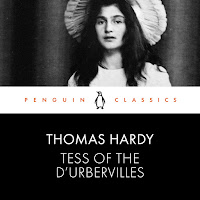'Tess of the D'Urbervilles' by Thomas Hardy
As long-term readers of this blog know, I struggle with The Classics. I'm sure I'm not the only one, just as I'm sure everyone has their own reason for avoiding Austen, distancing from Dickens, or backing away from the Brontës.I myself have been hiding from Hardy ever since we did 'The Mayor of Casterbridge' at school. I don't remember much about the experience, but since then have always associated Hardy with impenetrable, long-winded prose and depressing plots. But a recent encounter with 'Tess of the D'Urbervilles' may have changed all that. Well, the first bit anyway.
Introducing Tess Durbeyfield
When an amateur genealogist tells John Durbeyfield that he's descended from one of the county's great and ancient families, Durbeyfield is overjoyed. He and his wife, Joan, are determined to make the most of this apparent change in status. Their pride and ambition places their eldest daughter Tess in the way of two men: the nouveau riche playboy Alec D'Urberville and upstanding intellectual Angel Clare. Tess's naivety makes her easy prey for the lascivious Alec, leaving her ashamed and determined to atone for the sin by living an industrious and solitary life. But this decision is tested when she meets clergyman's son Angel, and they fall in love. In a time of strict social morals, when women must be pure and virtuous above all else, can they leave Tess's past behind them and find happiness?
Sex and the Country
The first thing that struck me about this book was that, despite being 130 years old, the story is shamefully relevant. While sex and birth outside of marriage no longer create outcasts, as a society we're still struggling to detatch how we think about relationships from traditional ideas of femininity, morality and desire. 'Tess of the D'Urbervilles' is about victim blaming, consent and the abuse of power, which, as shown by the #MeToo movement and ongoing discussions around the prosecution and punishment of sexual crimes, are still extremely relevant. Whether Tess's encounter with Alec was rape or consensual is still often the biggest discussion point of this story. While the Tess of today may be less ashamed, and therefore brave enough to speak out against Alec, the stereotypes experienced by the 19th century version would still affect whether others believed her or thought her at fault.
The Language of Landscape
For this post, I listened to the Penguin Classics audiobook version of 'Tess of the D'Urbervilles', read by 'Fleabag' and 'Vanity Fair' actor Sian Clifford. I often struggle with classic literature because, pre-20th century at least, I find it quite wordy, so my mind easily wanders elsewhere. Listening to 'Tess of the D'Urbervilles' rather than reading it does seem to have made a difference, however. I was kept on the edge of my seat throughout and enchanted by the same scene setting that would normally cause me to lose focus. I'm amazed Clifford made it to the end of some of those lengthy, descriptive sentences without making a mistake or running out of breath!
History as Fiction
Something else that I hadn't appreciated before was the way the novel is also an historical document of rural life at the end of the 19th century. This is an era of great change, when trains have opened up new markets for farm produce and work normally done by hand is being mechanised. Just as Dickens resurrects Victorian London, so Hardy does Dorset, far more so than all the museums and steam fairs I've been to over the years. Light relief was often provided from the tense central story by these scenes. One that sticks in the memory is of the labourers complaining that the new threshing machine doesn't do the job as well as they could using traditional flails. Some things never change!
Overall
'Tess of the D'Urbervilles' is a tragic, romantic and thought-provoking tale that still captivates after all these years, despite a few cheesy set pieces. Tess herself is a character that is frustrating to modern sensibilities, but understandable in the context of her own time. Some may find her unbearable, the victim of her own pride and architect of her own misery (Why couldn't she have kept her mouth shut?!), but though she gets it wrong in our eyes, it's hard not to feel sympathy for a character whose downfall is built on a foundation of male exploitation, and comes from a desire to do what she believes to be the right thing. Some readers may find her annoying, but many will feel pity and hope, against our knowledge of Hardy, that there might be a happy ending.
Listening to 'Tess...' as an audiobook really worked for me. I'd recommend it if you're also someone who struggles with reading Hardy's prose. It's hard not to smile at the Westcountry accents to start with, but that soon fades as you get into the story. This isn't good to listen to while driving though. Partly because you can't concentrate on the details, and partly because you won't be able to see through your tears of frustration and sorrow. It could have all been so different.
Now, what next...?
This review is based on the Penguin Classics 2019 audiobook of 'Tess of the D'Urbervilles' (published 1891) by Thomas Hardy. It is read by Sian Clifford and I borrowed via my local library service.
